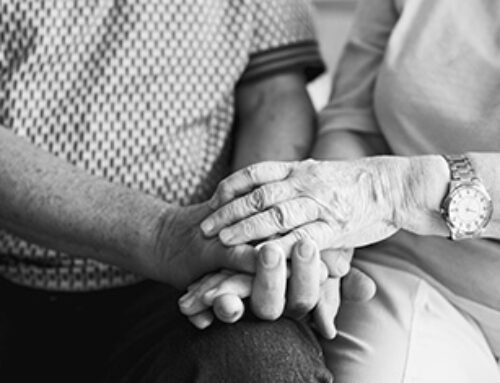5 Ways Community Health Workers Engage with Hispanic/Latino Older Adults
Published July 2021 | Read this article in Spanish.
The older adult population is growing in the United States and older Hispanic/Latino adults are the fastest-growing group. Hispanics over 65 years old are expected to grow from 4.6 million in 2017 to 19.9 million in 20601. It is important to engage Hispanics in health services as they age to promote health and wellbeing; reduce health disparities; and prevent social isolation, injury due to falls, and the development of chronic conditions. These engagement strategies must meet individuals where they are and provide information in a way that is easy to understand and relates to their cultural values and norms.
Community Health Workers (CHWs) or Promotores de Salud (in Spanish) are trusted members of the community who empower their peers through education and connections to health and social resources. Here are five CHW Core Competencies that CHWs use to engage older Hispanic/Latino adults!
1. Outreach
CHWs know how to find hard-to-reach Hispanic/Latino older adults because they are from the same communities. They identify key places where older Hispanic/Latino adults frequent including religious institutions, community-based organizations, and other important community hot-spots. CHWs are a bridge to health and social services; they conduct home visits and facilitate meetings in the community that engage older adults who may be isolated or have disabilities.
2. Relationship Building
CHWs build trusting relationships with the communities and individuals they serve. They have a community presence and people know who they are. They build trust by providing support and follow-up with their clients, practicing active-listening skills, and simply showing individuals that they care. They provide social support in difficult times, like throughout this global pandemic. This keeps older adults engaged in their care.
3. Cultural Mediation
CHWs have a unique way of mediating between medical professionals, or even the health system at large, and communities and individuals. They are an important part of a healthcare team because they help medical and other service providers understand the unique cultural factors that influence older Hispanic/Latino health and decision-making. Older Hispanic/Latino adults, especially those who are immigrants, can have difficulty navigating the complex U.S. healthcare system due to language barriers and because it operates so differently from systems in other countries. CHWs are often bilingual and understand these differences, which makes them very skilled at supporting and empowering older adults as they navigate the healthcare system.
4. Culturally Appropriate Education and Information
Health information is laced with medical jargon that is difficult for anyone who is not a medical professional to understand. This is especially true for older adults living in the U.S. with limited English proficiency. CHWs bridge this gap by providing culturally appropriate education and information, such as translating medical jargon and complex health information into clear and understandable terms in the preferred language of their clients.
There are a lot of resources that can be used to help CHWs do this! MHP Salud and Hebni Nutrition Consultants, Inc., created an educational health plate called “Sabor y Salud” tailored for Mexican Americans and Caribbean Americans representing their preferred diets. Other organizations have developed unique culturally appropriate tools to engage Hispanic/Latino older adults, like this fotonovela that CHWs use to educate older adults and their caregivers in the Hispanic/Latino community about dementia. Check out our resource portfolio for free CHW resources!
5. Advocacy
The CHW profession is exceptional because CHWs have loyalty not only to the organizations they work for but, more importantly, loyalty to the communities they serve! CHWs advocate for the people they work with and for their communities. This advocacy work includes listening to clients, identifying needs, and connecting people to the appropriate resources. Advocacy engages older adults because they feel empowered to take control of their lives and situations.
What Are Some Examples of CHW Programs Engaging Older Hispanic/Latino Adults?
MHP Salud’s Aging in Place program is a great example of how CHWs engage older Hispanic/Latino adults to enhance their quality of life. Over a period of six months, CHWs establish relationships with program participants through a series of home visits, phone calls, and social opportunities. CHWs lead educational classes and activities that address common challenges faced by older adults who are living independently in their own homes, such as addressing social isolation, incorporating healthy lifestyle habits, and making connections to support services. Adults who completed the program reported feeling an increased quality of life and a decreased feeling of isolation. Additionally, older adults also receive home modifications, such as ramps, railings, and air conditioning installations.
One CHW program, the Health + Housing project (managed by the U.S. Dept. of Housing and Urban Development), placed bilingual CHWs in subsidized housing to provide residents with case management and connections to social and medical services. Residents reported feeling more connected to services in the community because of the engagement with CHWs in their homes and neighborhood. In fact, older adults tended to use this service more than any other age group – residents aged 65+ received more CHW visits on average.2
El Sol Neighborhood Educational Center uses a CHW-led mental health program to improve the well-being of older Hispanic/Latino adults at risk of experiencing advanced late-life depression. El Sol’s CHWs use an evidence-based program designed to engage with older adults in their homes to teach behavioral techniques and problem-solving skills. Nearly all the program participants (91%) reported experiencing a significant reduction in their depressive symptoms.3
The CHW workforce is uniquely qualified to engage older Hispanic/Latino adults in their healthcare and take control of their lifestyles. Through outreach, building relationships, cultural mediation, culturally appropriate education and information, and advocacy work, CHWs improve health and wellbeing in their communities. Ask yourself, who can engage older adults better than a CHW?
For more information about starting your own CHW program, check out this resource!
- https://acl.gov/sites/default/files/Aging%20and%20Disability%20in%20America/2018HA_OAProfile.pdf
- Freeman, A.L., et al. (2018) A Pilot Community Health Worker Program in Subsidized Housing: The Health + Housing Project. Cityscape 20(2): 19-38. U.S. Department of Housing and Urban Development. Retrieved from: https://www.jstor.org/stable/26472165?seq=1
- https://www.elsolnec.org/wp-content/uploads/2020/08/el-sol-1pg_FINAL-1-2.pdf
This project was supported, in part by grant number 90HDRC0004-01-00, from the U.S. Administration for Community Living, Department of Health and Human Services, Washington, D.C. 20201. Grantees undertaking projects under government sponsorship are encouraged to express freely their findings and conclusions. Points of view or opinions do not, therefore, necessarily represent official Administration for Community Living policy.
Blog Topics
About MHP Salud

MHP Salud has over 35 years of experience implementing CHW programs and training organizations looking to start and/or strengthen their own CHW programs. Visit our CHW Training & Consulting Services page to learn more about how we can help.
This brochure, created by MHP Salud and Hebni Nutrition Consultants, Inc., was designed to help Hispanic and Latino Communities build nutritious plates with familiar fresh foods.







